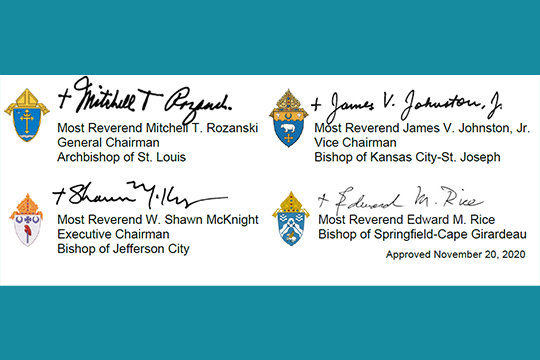Missouri’s Roman Catholic Bishops issue statement on COVID-19 vaccines
Missouri’s Roman Catholic bishops, in their role as officers of the Missouri Catholic Conference, issued the following statement on Nov. 20.
The statement’s signatories include: Archbishop Mitchell T. Rozanski of St. Louis; Bishop James V. Johnston Jr. of Kansas City-St. Joseph; Bishop W. Shawn McKnight of Jefferson City; and Bishop Edward M. Rice of Springfield-Cape Girardeau.
“For most of 2020, the human family around the world has faced a pandemic that has impacted and disrupted our social, economic, political, and religious lives.
“As a result of the COVID-19 crisis, people have lost loved ones, homes, businesses, livelihoods, a sense of well-being, and the comfort and closeness of family and friends.
“As we head into the winter flu season, anxiety levels remain high as the number of COVID-19 cases continue to increase in many parts of our state, nation and world.
“The prospect of a vaccine raises hopes, but the research involved in vaccine development also raises ethical concerns, which we wish to briefly address:
“The Catholic Church has long advocated for research into medical cures for diseases which utilize ethical means to bring about these cures. We renew our call for the scientific community to reject the use of fetal tissue from abortions for scientific discovery and medical research; instead, these corpses should be granted the same respect one would offer the remains of other human beings (1).
“In this arena, as in all others, noble ends do not justify unethical means.
“There are currently over 300 vaccines under development, and we anticipate several will be approved and distributed for use in the near future. Fortunately, there are vaccines in line to be released soon that do not raise ethical concerns, even if some do.
“Regrettably, the existence and use of problematic cell lines derived from voluntary abortions performed in the past is an ongoing concern with respect to a number of areas of medical research today.
“The vaccines currently in development that utilize problematic cell lines, however, should not keep Catholics from seeking vaccination. Preserving one’s health and that of others outweighs the remote association with past abortions which were neither desired nor intended by those now using the vaccines (2).
“It is our hope and prayer that the vaccines for COVID-19 in line for release will be safe, effective, and developed, produced, and distributed in an ethically acceptable manner.
“Everyone should have access to a safe and effective vaccine, and no one should have to face being inoculated with a vaccine derived in an unethical manner.
“Although it can be morally permissible to receive vaccines that were derived in an unethical manner, when equivalently safe and effective vaccines that don’t rely on such cell lines are available, such alternatives should clearly be the preferred option.
“Catholics may in good conscience utilize vaccines, even those derived in an unethical manner, in order to protect themselves, as well as to avoid the serious risk to vulnerable persons and to society as a whole resulting from remaining unvaccinated (3).
“At the same time, Catholics should keep in mind that they have a duty to make known their disagreement with using a vaccine derived in an unethical manner and to ask that the healthcare system and pharmaceutical companies make available ethically-derived vaccines (4).
“We call upon Catholics and people of good will to pray and work for the continued development and distribution of safe and effective vaccines that are untainted by involvement or association with abortion.”
(1). Congregation for the Doctrine of the Faith, Instruction Donum vitae, I, 4; AAS 80 (1988), 83.
(2), (3) and (4). Congregation for the Doctrine of the Faith, Instruction Dignitas personae, No. 35.







